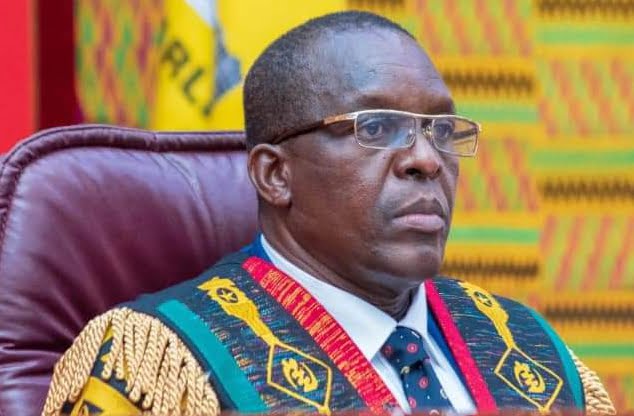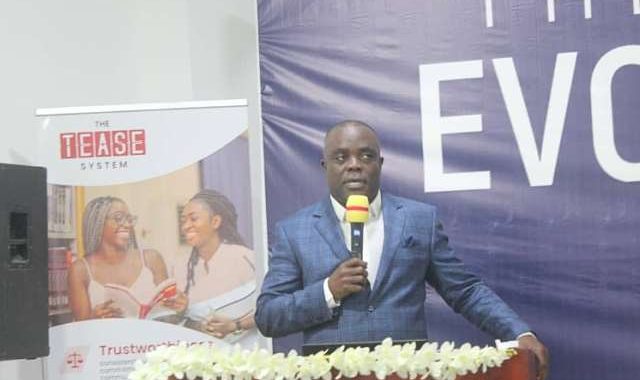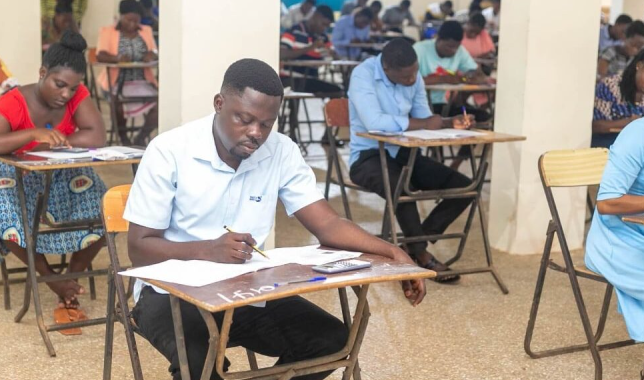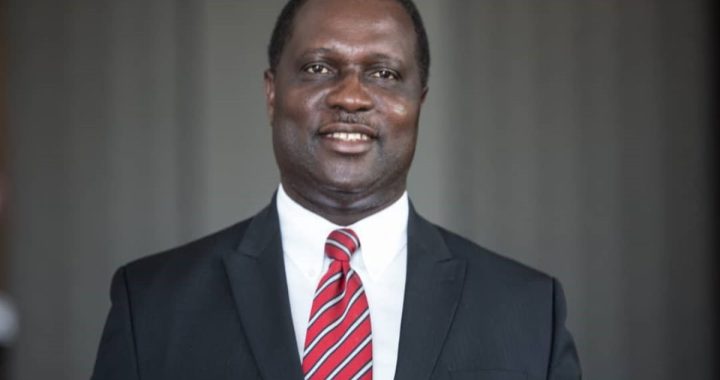Full Statement By Alban Bagbin On The Motion To Pass A Vote Of Censure On Ken Ofori Atta

Below is the formal statement by Rt Hon Alban Sumana Kingsford Bagbin on Motion To Pass A Vote Of Censure On The Minister Responsible For Finance Thursday, December 8 2022, in Parliament.
Introduction
Hon Members, I come under item 2 of the Order Paper to make this statement. I also seek refuge under Standing Order 70 (1) of the Parliament of Ghana. The said Order states as follows;
“70. (1) Mr. Speaker may make statement on any matter of interest to the House.”
For the first time this House is confronted with handling a motion calling on it to pass a resolution of a vote of censure on a Minister of State in accordance with Article 82 of the Constitution and Orders 106 and 108 of the Standing Orders of Parliament. I am of the firm opinion that the procedure to adopt is a matter of interest to the House and of even more importance to the general public, whose interest we serve in this House.
Furthermore, the novelty of the matter makes it compelling that I guide the House on the process and procedure to follow to resolve to pass or not to pass a vote of censure.
Hon Members, it is my humble submission that a combined reading of Articles 93 (1), 95 (I), 101 and 102 of the 1992 Constitution, together with Standing Orders 5, 6, 8, 40 (1), 151 (1) and (2) and the spirit and letter of the Standing Orders of Parliament, in general, define the composition of Parliament to include not less than one hundred and forty (140) elected members and the Speaker of Parliament.
Order 7 defines “House” to mean Parliament. Accordingly, the House is made up of not less than 140 elected members and the Speaker of Parliament.
Hon Members, on Tuesday, 10th November 2022, the Minority Leader, Hon. Haruna Iddrisu, moved a motion calling on the House to resolve to pass a vote of censure on the Minister for Finance, Mr. Ken Ofori-Atta, in accordance with Article 82 of the 1992 Constitution. The motion for the vote of censure was based on seven grounds as stated on the Order Paper.
The Deputy Majority Leader, Hon. Alexander Kwamena Afenyo-Markin, raised a preliminary objection to the motion, contending that the procedure adopted by Parliament pursuant to Article 82, offends the ultra vires and audi alteram partem rules.
According to the Deputy Majority Leader, Parliament had no judicial authority or mandate to conduct investigation into the grounds stated in the motion as the basis for the vote of censure since some of the allegations levelled against the Minister border on the commission of a crime and Parliament is not clothed with the mandate to conduct a criminal trial of any person.
To the Hon Deputy Majority Leader, what Parliament was invited to do by the Minority Leader amounted to an invitation to conduct a criminal trial of the Minister.
The Deputy Majority Leader further contended that even if Parliament had jurisdiction over the matter, the Minister responsible for Finance is entitled to be heard in defense. He had to be put on notice by being served with the grounds for the vote of censure. In other words, the procedure for a vote of censure ought to provide a right to a fair hearing as guaranteed under Articles 19 and 296 of the 1992 Constitution.
I straight away overruled the preliminary objection. In my ruling on the preliminary objection, I indicated that it was not within my powers as Speaker to interpret the Constitution but to apply it. Issues on constitutional interpretation and enforcement clearly belong to the remit of the judiciary and not the Speaker. I did not give reasons beyond this. What is however clear is that the process for a vote of censure is not a trial, what more a criminal trial.
The is a quasi-judicial process of a political nature and carries no legal consequences or liability, whether civil or criminal. Article 19 of the Constitution which deals with criminal trials is not thus applicable. Parliament is therefore intra vires and not ultra vires in admitting and permitting the Minority Leader to move the motion to invoke the powers of Parliament to resolve to pass a vote of censure on the Minister for Finance.
On the issue of the audi alteram partem rule (i e, listen to the other side or let the other side be heard as well) relied upon by the Deputy Majority Leader as the bases for the preliminary objection, the provisions in both the Constitution and the Standing Orders of the House amply provide for it. The rules provide for an opportunity for the Minister to be heard in defense. This forms the bases for my assurance to the House that the Hon Minister responsible for Finance is entitled to a fair hearing and will surely be given ample opportunity to be heard in defense. Both the Sponsors of the motion for the vote of censure and the Minister will be given uninhibited opportunities to put across the reasons for and against the motion to enable the House take the vote.
In accordance with Standing Order 86, I enquired to know whether there is a seconder to the motion. Hon Mohammed Mubarak Muntaka, the Minority Chief Whip seconded the motion. After the motion had been seconded, I decided to refer the matter to an Ad hoc Committee and in consultation with the Leaders, constituted an Eight-Member Ad-hoc Committee to inquire into the matter and report to the House within seven working days for debate and vote.
Controversy
Hon members, you will recall, the referral of the matter to the Ad-hoc Committee was vehemently objected to by some Members of Parliament and the public. This School of thought opined that the procedure adopted by me was irregular and unsupported by law and insisted the debate on the motion should proceed and vote taken that day.
Hon. Members, the call for a vote of censure is novel in this Parliament. What I sought to do, after extensive consultation, was to provide for a procedure to guide the House. And I am convinced, my decision to refer the matter to a committee of the House is the right thing to do. I now proceed to refer to the facts and the law in support of the decision.
On the question of facts, the pre-sitting consultations with leadership of both sides of the House revealed that the Minister was out of the jurisdiction of this House on the 10th of November 2022 on official assignment and could therefore not be present in the House. The absence of the Minister was also visibly loud and manifest on the floor of the House that day. How could the debate proceed and end that day without the Minister being given the opportunity to be heard in defense before the vote is taken that day?
On the question of law, Order 106 (1) is clear. It says;
“106 (1) The House may pass a resolution to remove the President, the Vice-President, Mr. Speaker, and Deputy Speakers and a vote of censure on a Minister of State. The House may consider such motion and come to a decision or refer it to a Committee on a motion made by any Member”.
Hon Members, emphasis is on a Committee. There is no such existing Committee on motions to pass a resolution to remove or on a vote of censure on a Minister of state. Therefore, I am of the view that a member could not have moved a motion to refer the matter to an non-existing Committee
The Constitution and the Standing Orders of Parliament have provided a solution in the absence of such a Committee. I will deal with that shortly
A vote of censure
Hon Members, it is important to draw your attention to this underlying guiding concept of the custom and law of Parliament and the underpinnings of parliamentary practice and procedure. The law and custom of Parliament and parliamentary practice and procedure are more in the world of politics than law. The law is in the bosom of the judge and not Parliament or the Speaker. The reason why judges are referred to as the law lords. Politics is in the bosom of the polity, the community, the people. Parliament is the House of the people and Parliamentarians are the representatives of the constituents. But the House must perform its functions and conduct its mandate in accordance with the provisions of the Constitution, the Standing Orders, and what is generally referred to as the law and custom of Parliament.
Parliament must provide unlimited opportunities for open debate in consonance with the rights and freedoms, privileges and immunities of members and officers of the House.
Hon. Members, a careful reading of the rules of procedure set out in the Constitution and the Standing Orders, leaves nobody in doubt that there are legal prerequisites before a motion to consider a vote of censure is admitted. To paraphrase the prior requirements for the admission of such a motion, the law says, a motion for a resolution to censure a Minister under Article 82 shall (i) be signed by not less than one-third of all the members of Parliament and (ii) be received by the Speaker.
But before such a motion could be moved after been admitted, two further requirements must be complied with; (i) seven days’ notice should have been given of the motion; and (ii) the motion shall be debated within 14 days after the receipt by the Speaker of the notice for the motion.
A notice of a motion is received by the Speaker when it is acknowledged in the office of the Speaker as so received. A notice of a motion is received by the House when the motion is published on the Order Paper of the House as Notice of Motion. All these prescriptions were meticulously followed and complied with. In consultation with leadership of both sides of the House, the 14th day after receipt of the motion by the Speaker fell on the 10th of November, 2022. The motion of censure was thus programed and published on the Order Paper to be moved on that day.
Opportunity to be heard in Defense
Hon. Members, controversy emerged on the procedure to adopt to provide a fair opportunity for the Minister to be heard in defense. The disagreement centered on the import of Clause 4 of Article 82, which states that “A Minister of State in respect of whom a vote of censure is debated under Clause (3) of this article is entitled, during the debate, to be heard in his defense”. It is important to note that Article 82, Clause 3 of the Constitution, specifies that the vote of censure “shall” be debated by the House. This constitutional provision is repeated in Order 108 (b) of the Standing Orders of the House.
A Minister of State in respect of whom a vote of censure is debated is thus entitled to two procedural rights,
i. Is entitled to be heard in defense.
ii. Is entitled to be heard during the debate.
In so far as debates in Parliament are concerned, Articles 101, 110 and 111, of the Constitution and Order 86 of the Standing Orders of Parliament set out in great detail the rules which regulate debates in this House. A reading of the Order and the Constitution, will leave no doubt in any anyone’s mind that it provides only for Members of the House and by virtue of Article 111 of the Constitution, includes the Vice-President, or a Minister or Deputy Minister, who is not a member of Parliament. These are the only persons who are allowed to speak and debate during plenary sittings of the House.
Defined by Article 295 (1) of the 1992 Constitution and Standing Order 7, “sitting” “includes a period during which Parliament is sitting continuously without adjournment and a period during which it is in Committee.”
Hon Members, all other persons outside this category, are referred to as strangers. Defined by Standing Order 7, “stranger” means any person, other than the President, Vice-President, Mr. Speaker, Ministers and Deputy Ministers who are not Members or officers of the House; Clearly this Standing Order has included the President and Mr. Speaker. But in the case of Mr. Speaker, Standing Order 90 settles the matter. “Mr. Speaker shall not take part in any debate before the House”.
To Be Heard in Defense
Hon Members, both the Constitution and the Standing Orders require that the Minister against whom a vote of censure motion is moved is entitled to be heard in defense. What does to be entitled to be heard in defense mean? And how is Parliament to make rules for the practice and procedure for the Minister to be heard in defense?
Hon Members, there is not much procedural guidance in both the Constitution and the Standing Orders on the issue of a vote of censure on a Minister of State apart from the terse framework capture in Article 95 and Orders 106 and 108 of the Standing Orders of Parliament. In the case of the removal of the President, Vice-President, Speaker and Deputy Speakers, an elaborate procedure has been detailed out in both the Constitution and the Standing Orders of the House. Members may read both Articles 69 and 95 of the Constitution and Orders 106 (2) and 107 (1) of the Standing Orders of Parliament.
Hon Members, time will not permit me to go into detail, but suffice to say that in both situations, the phrase to be entitled … to be heard in defense is repeated. For instance, in the case of the removal of the President, Article 69 Clause 7 states as follows;
“69. (7) The President shall be entitled during the proceedings of the tribunal or of the medical board to be heard in his defense by himself or by a lawyer or other expert or person as the case may be, of his own choice.”
This provision is repeated in the rules of practice and procedure in the Standing Orders thus;
“106 (2) (f) A motion for resolution to remove from office the President or Vice-President shall … during prior proceedings in a Committee appointed in that behalf, the President or the Vice-President shall be entitled to be heard in his defense either by himself, by Counsel or by an expert as the case may be.”
In the case of the Speaker or Deputy Speaker, the Constitution is not so elaborate on the practice and procedure of removal. See Article 95 (2) of the 1992 Constitution. The Standing Orders of Parliament has however taken care of the procedure. Order 107 (1) (c) says “prior proceedings shall be taken in a Committee appointed in that behalf. The Speaker or the Deputy Speaker shall be entitled to be heard in defense either by himself or a representative.”
Such a provision is absent in the proceedings of a vote of censure on a Minister of State. Both the Constitution and the Standing Orders of Parliament do not provide for such an elaborate procedure. The Constitution and the Standing Orders simply say in Article 82 (4) that “a Minister … is entitled, during the debate, to be heard in his defense” and Order 108 say “during the proceedings on the motion, the Minister shall be heard in his defense.”
Hon Members, it is my humble view that in such a situation, I am called upon as the Speaker, to perform my duty to provide for such a rule or procedure not provided for. In accordance with Order 6 of the Standing Orders of the House;
“6. In all cases not provided for in these Orders, Mr. Speaker shall make provisions as he deems fit.”
Hon Members, let each and every one of us ponder over this matter.
1. How could Parliament be seen to have given the Minister a fair hearing in a motion to pass a vote of censure without an inquiry into the grounds on which the motion is based? Can the Minister’s lawyer or expert participate in plenary debate, as counsel or expert, in the exercise of the Minister’s right to be heard in defense, when the counsel or expert is not a Vice-President, or Mr. Speaker, or Deputy Speaker or Minister of State or Member of Parliament but a stranger?
2. Can members of Parliament or the Minister, during a debate at plenary, tender documents, records, books and be cross-examined in the course of such debate?
3. Can the Minister’s lawyer raise objections during such a debate?
Hon Members, the Orders 106, 107 and 108 of the Standing Orders of Parliament admit of a situation where the House or a Minister in respect of whom a vote of censure is to be passed, summons or calls witnesses in accordance with the provisions of Articles 103 (6) and 121, and Standing Orders 201, 202, 203, 205, 206, and 207 to attend or be compelled to attend, to be examined on oath, affirmation or otherwise, and to give evidence or to produce a paper, book, record or other documents before the House. Such a witness is entitled, in respect of his evidence, or the production of the document, as the case may be, to the same privileges as if he were appearing before a court. Please. Let us ask ourselves, can this be done in the course of a debate at plenary? The answer is an obvious NO.
Decision to constitute an ad-hoc Committee
It is in the light of the above that upon consultation with the Leaders of the House I decided to adopt the rules of practice and procedure in respect of the phrase to be heard in defense, laid out in the Constitution and the Standing Orders in the case of the removal of a President, Vice-President, Speaker or Deputy Speaker. I read the absence of such rules in the Standing Orders in the case of a vote of censure on a Minister as an oversight.
Hon Members. I am of the firm opinion that equal opportunity would be provided in such a situation for both the proposers and the Minister, to detail out the facts, supported by the necessary documents, on which it is claimed that a resolution on a vote of censure be passed against the Minister, and the Minister to be heard in defense, during the proceedings and debate on the motion. It is informative to note that under Standing Order 201, a Committee shall have power to request the Attorney-General to attend upon it to give assistance and a witness before any Committee may also be represented by counsel.
Hon Members, the House has no appointed any Committee on this subject matter. The House is yet to establish a specific Committee to do so as has already been done by other Parliaments. The process we are developing now, in my humble view, will be of immense assistance to Parliament in its ongoing efforts to revise the current Standing Orders of Parliament.
Conclusion
The information I have shared with you and the public leaves me in no doubt whatsoever that the procedure adopted by the referral of the matter to the ad hoc Committee for inquiry is well rooted in law. I am convinced that the public hearing conducted by the Committee has vindicated my decision and allayed the fears of all those who had thought otherwise. Fortified by this conviction, I rule that the referral of the motion to pass a resolution on a vote of censure on the Minister of Finance to an ad hoc Committee for inquiry is proper and in accordance with the law.
Hon members, the House may now proceed to debate the motion.
Hon. Members, I thank you for the audience.
2
Send Stories | Social Media | Disclaimer
Send Stories and Articles for publication to [email protected]
We Are Active On Social Media
WhatsApp Channel: JOIN HERE
2024 BECE and WASSCE Channel - JOIN HERE
Facebook: JOIN HERE
Telegram: JOIN HERE
Twitter: FOLLOW US HERE
Instagram: FOLLOW US HERE
Disclaimer:
The information contained in this post on Ghana Education News is for general information purposes only. While we endeavour to keep the information up to date and correct, we make no representations or warranties of any kind, express or implied, about the completeness, accuracy, reliability, suitability or availability with respect to the website or the information, products, services, or related graphics contained on the post for any purpose.





 Dominion University College launches TEASE Evolution initiative
Dominion University College launches TEASE Evolution initiative  Teen earns doctoral degree at 17 after defending her dissertation
Teen earns doctoral degree at 17 after defending her dissertation  TTAG petitions NTC over 2024 GTLE results due to GES recruitment
TTAG petitions NTC over 2024 GTLE results due to GES recruitment  Government to Affiliate new Schools With Best Ones to Boost Education Standards
Government to Affiliate new Schools With Best Ones to Boost Education Standards